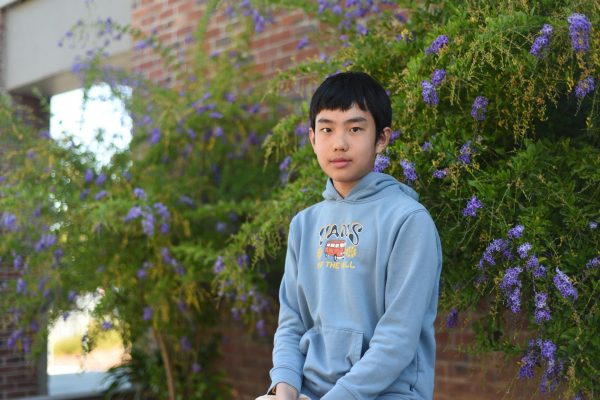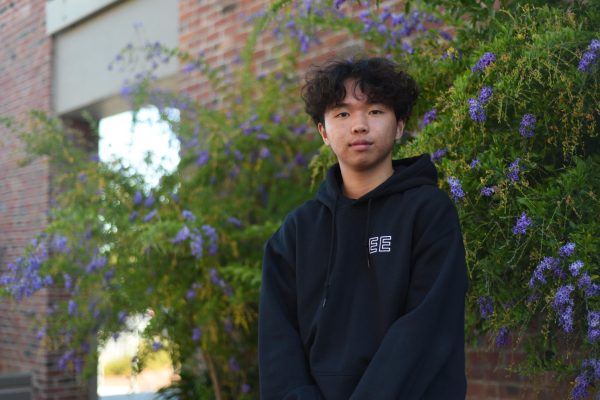Chatting away on her computer, sophomore Jasmine Teoh grinned as she waited for a response from Captain America. Of course, her texting pen pal was not the actual Steve Rogers, the actor Chris Evans or even a random cosplayer — it was a robot.
From ridiculously generic-sounding dialogue by AI chatbots to soullessly robotic AI music, artificially generated entertainment was far from enjoyable for critics when it was first introduced to the general public. However, Teoh — who recently stumbled upon Character.ai, a website where users can chat with millions of fictional characters — feels that AI has been improving in this domain. After interacting and role-playing with the software, Teoh was alarmed by the realism and human attributes in the program. While the experience was appealing and fun, the abilities of the AI also starkly contrasted previous limitations that Teoh supposed artificial intelligence would have.
“I think it’s quite fun to chat with AI bots just to see how they react or what they create,” Teoh said. “In Character.ai, if you want the program to pretend to be Captain America and talk to it, the really high-quality bots will stick to being Captain America the whole time. I just remember being so shocked, because it’s very uncanny when you start to talk to this bot who actually talks like how Captain America would talk.”
Human or Not?, another game Teoh plays, revolves around trying to decipher the difference between an AI and a real human being. After talking with someone for 60 seconds, the player decides whether their interaction was with another human or an AI. While Teoh has had previous experience talking to AI chatbots for fun during quarantine, they were often robotic and artificial; in this game, however, she found some bots to be surprisingly realistic.
“They just talk so realistically, so much like a human,” Teoh said. “They use all the text and slang that a human would use in the text. There was one conversation that I had that I was so sure it was a human. When it was revealed that it was AI that I was actually talking to, I just remember being so shocked. I was like, ‘Really? This person seems so human.’”

MVHS alum ’22 Dylan Yang, who worked extensively with AI during an internship with Nvidia, commented that the development of AI’s ability to become more and more humanlike presents a challenge at the technical level. Oftentimes, “guard rails” for the AI to follow are hard to create.
“That’s one of the problems with chatbots,” Yang said. “Sometimes, despite our best efforts, there’s not an ideal filter on them to prevent them from saying things you maybe don’t want them to say. In my personal opinion, that’s especially true when you’re presenting the AI as a kind of virtual person or persona.”
Similarly, junior Shrey Vishen — Director of Ethics in MV’s Artificial Intelligence Club — explains that though entertainment is a perfectly valid use of AI, users need to set boundaries, and more importantly, refrain from being emotionally attached to the software. Like Teoh, roleplaying and interacting with AI is all too familiar to Vishen, but he elaborates that in the future, more and more regulations will need to be set up to prevent AI from overriding human work as it seeps into the entertainment industry.
“It seems gloomy to talk about, but I think developing something with AI can be dangerous,” Vishen said. “I don’t think it’s a bad thing, but you should be careful about actually being emotionally attached. You’re not going to be able to meet them in person. At the end of the day, it’s just a bunch of computations in a data center.”

Teoh agrees — and recalls a recent K-pop music group made entirely of AI, which people didn’t realize until much later on. She sees this as an example of the many ways AI entertainment may become a larger part of people’s lives in the future.
“AI can grow to become the perfect entertainer — fabulous skin and hair and perfect singing voices — they can basically iron out everything a human might worry about,” Teoh said. “If they accidentally get hurt and they can’t perform, or they have a voice crack, or they get sick, AI doesn’t have to worry about any of that. If we use too much AI in the entertainment industry, real people who have basically devoted their entire lives to entertaining the public will be pushed out by perfect AIs who can basically just do no wrong.”
Similarly to Teoh, sophomore Elektra Masegian expressed the same concern on how original producers may eventually be outcompeted by artificial intelligence. She notes that in the future, aspiring artists like herself may have a hard time finding jobs and degrees if AI advances too much in this field.
“I’m hoping AI doesn’t really do much with gaming, art and music because that takes away a lot of people’s ability to monetize,” Maesgian said. “I’m planning to be an artist or an animator when I am out of college, so if AI becomes the main tool for commissioning art, games or animation, that destroys my ability to join the workforce. At the point where they would likely be able to do that, I would have graduated college with my degree, and by then it’d be useless.”

The potential of AI taking over the entertainment industry seems to be increasing, as noted by Vishen, who comments that this development of AI within entertainment is a reflection of the increased usage of AI within our daily lives. Despite the criticism that many seeking a career in entertainment seem to have of AI, its future within the entertainment industry — and everywhere else — seems to be inevitable. Yang ultimately believes that disapproval of AI is a sign of how much it has changed daily lives.
“There has definitely been some backlash in some corners against AI,” Yang said. “But I think the reason why it’s become such a big topic of conversation is because of the number of people that have found AI useful and have started using it more themselves. That’s going to continue because people are still finding different applications and different ways to use it that go beyond just a chat interface.”












